The exam will be held in 2025 (এটা 2025 সালের এক্সাম এর জন্য সাজেশান)
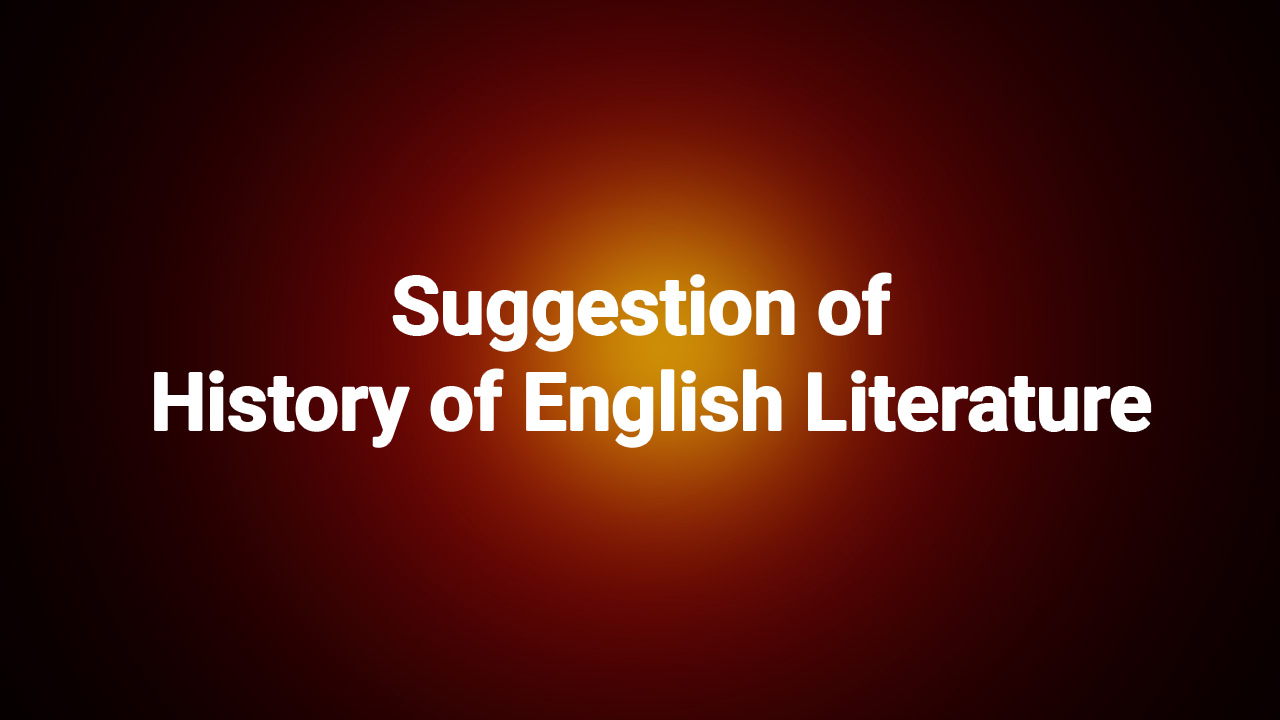
💥2nd year – Paid Online Course
Full Course: 250+ Recorded Live classes
Lecture sheets, Handnotes
Fee: 2,000/- এককালীন পেমেন্ট
ভর্তির নিয়মঃ
এককালীন ফিঃ ২০০০/- টাকা (পরে আর কোন প্রকার টাকা দিতে হবে না)
কি কি পাবেঃ
@ ২৫০+ রেকর্ডেড লাইভ ক্লাসের ভিডিও
@ লেকচার শিট (এটা পড়লে, বই না কিনলেও চলবে)
@ নোটস (ব্রিফ, শর্ট ও ব্রড)
@ ২৪ ঘন্টা সাপোর্ট (০১৭২৬-৭৫৭৯০৮)( কল / হোয়াটস অ্যাপ)
@ টিপস অ্যান্ড ট্রিক্স সুবিধাঃ
@ যখন খুশি তখন ক্লাস গুলো করে নিতে পারবে।
@ একটা নির্দিষ্ট সময়ে লাইভ ক্লাসে জইন করতেই হবে না
@ নেট ইস্যু হবে না, বোরিং লাগবে না
@ 6 মাসের টাকায় সারা বছর পড়তে পারছ—0—
Part – C
[Get an eBook about the features of all ages]
- *** Describe the social picture of the Anglo-Saxon period based on Beowulf/Middle English period.
- *** Discuss Chaucer as the father of English Literature.
- *** Discuss the features/elements/characteristics of the Renaissance Age.
- Discuss the features of the Elizabethan age.
- *** Discuss Shakespeare’s contribution to English Drama.
- Who are the University Wits? Discuss their contribution to English Drama.
- How did religion and politics affect the Puritan age/ features of the Puritan age?
- *** Discuss the historical and political background of the Restoration period/Characteristics of Restoration Literature.
- *** What are the salient traits of the Neoclassical Age?
- *** Discuss the features of 18th-century literature./Satire of Pope and Dryden./Age of Satire
- *** Discuss Tennyson as a representative poet of the Victorian age.
- Discuss Charles Dickens and Thomas Hardy as Victorian novelists./Contribution of Women novelists.
- *** Discuss the features/trends/traits/characteristics of the Victorian age./ Victorian Novels
- *** Discuss the conflicts between science and religion of the Victorian age.
- Describe the characteristics of the Romantic Age./Contribution of Romantic Poets
- *** Describe the influence of the French Revolution on romantic poetry.
- *** Describe the features of the modern age/poetry/novel/drama.
Part-B
- What do you know about King Alfred?
- Why did the Reformation happen in England?
- What is the Renaissance?
- In what sense is John Milton the classiest?
- For what is Ben Jonson remarkable in the Jacobean Period?
- Discuss the contribution of Sir Thomas More
- Write about the Globe Theatre.
- What is the Pre-Raphaelite Movement?
- Why is Bacon’s prose style significant??
- What Blake is called the precursor of Romanticism?
- Describe Coleridge’s ‘Willing Suspension of Disbelief’.
- Write a note on Keats’s Negative Capability.
- What are the features of Romantic Poetry?
- Write a note on “Stream of Consciousness”.
What do you know by “Victorian Compromise”?- What is the Symbolist Movement?
- What is Absurd Drama?
- What is Drama of Ideas?
Write a short note on-
- Beowulf/ The Wanderer/Piers the Plowman/Troilus and Criseyde/
Nun’s Priest’s Tale - Old English Ballads/Middle English Romances/Cynewulf
- Anglo-Saxon Chronicles/Wife’s Lamentation/Husband’s Message
- Anglicanism
- Norman Conquest
Black Death,- Peasants’ Revolt
- Protestantism/Catholicism
Puritanism- Gunpowder Plot
- Humanism,
- Pantheism
- Decadent Play
- The Canterbury Tales
- John Milton/Paradise Lost
- Metaphysical Poetry/poets
- Dramatic Monologue
- Comedy of Manner/Humour/Tragi-Comedy/Morality Play/Miracle Play
- Hundred Years War
- Utopia/Arcadia
- Blank-Verse,
- Tragedy,
- Morte d’ Arthur
- Heroic Couplet,
- Neo-Classicism,
- Victorianism.
Victorian compromise- The Coverly Papers
- The Spectator
Lyrical Ballads- University wits
- Elizabethan age/Golden age
- Oxford Movement
- Reformation
- French Revolution/Glorious Revolution
- Caxton Printing Press
- Restoration age
- Waiting for Godot/Gorboduc
- Caedmon
- The Origin of Species
Modernism- Hellenism
- The willing suspension of disbelief
- Supernaturalism
- Feminism
- Byronic Hero
- Sonnet/Heroic Couplet/Satire/Conceit/Epic/Ballad
- Paradise Lost/Gulliver’s Travels/Robinson Crusoe/Pilgrim’s Progress
- Martin Luther King/Cromwell/WB Yeats/ GB Shaw/Thomas Malory/Queen Elizabeth or Victoria
Question of 2023


Question of 2022/ গত এক্সামের প্রশ্ন এটা (এখান থেকে তোমাদের অর্থাৎ 23 সালের এক্সামে কমন আসবে না)
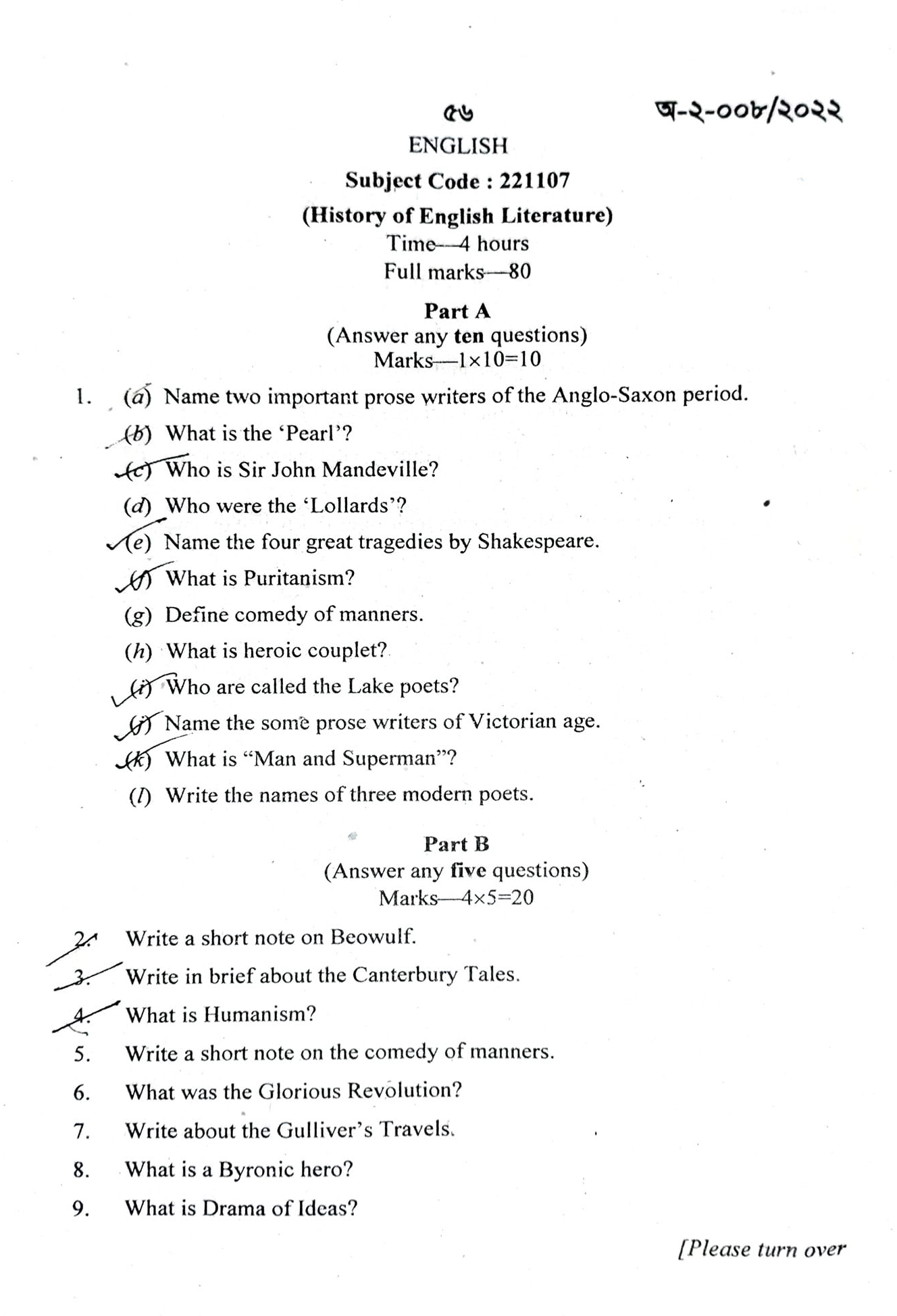
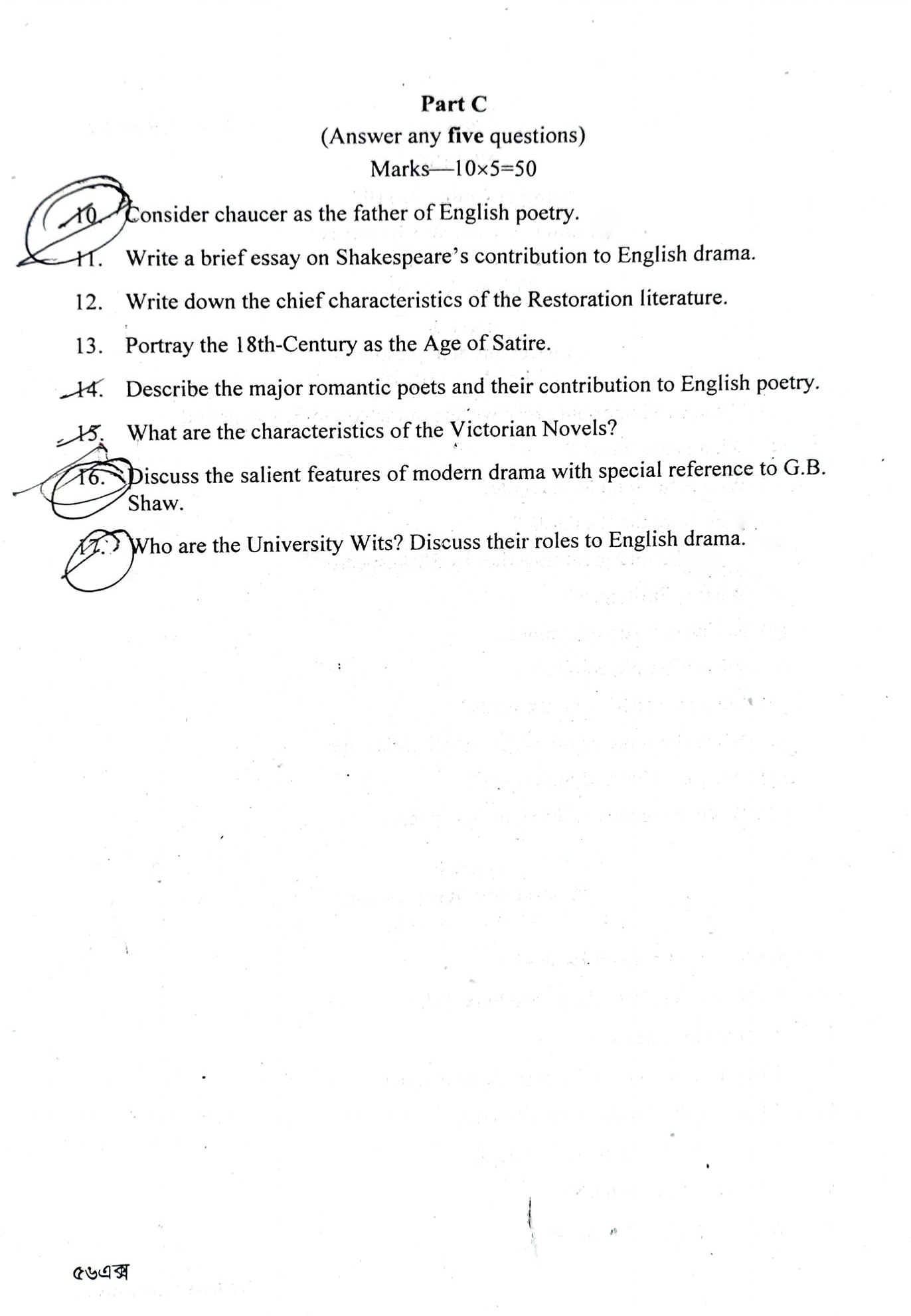
Questions of 2021
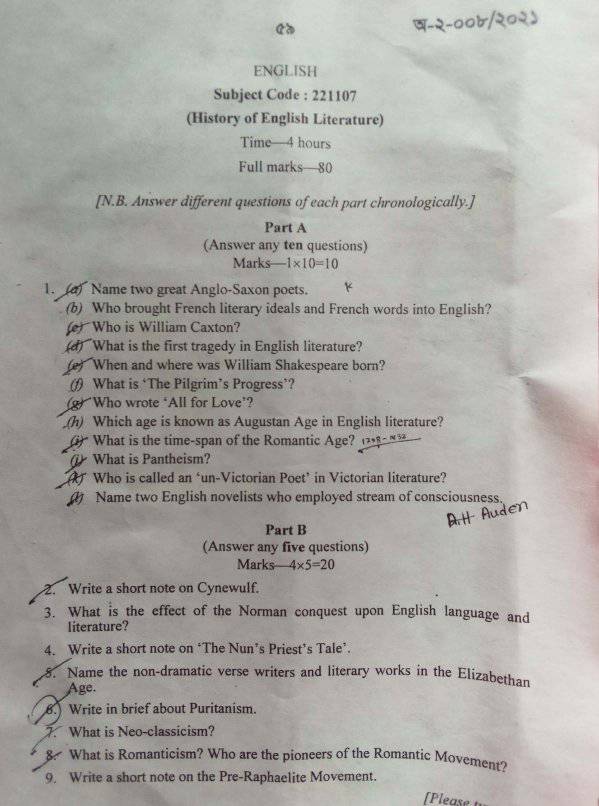
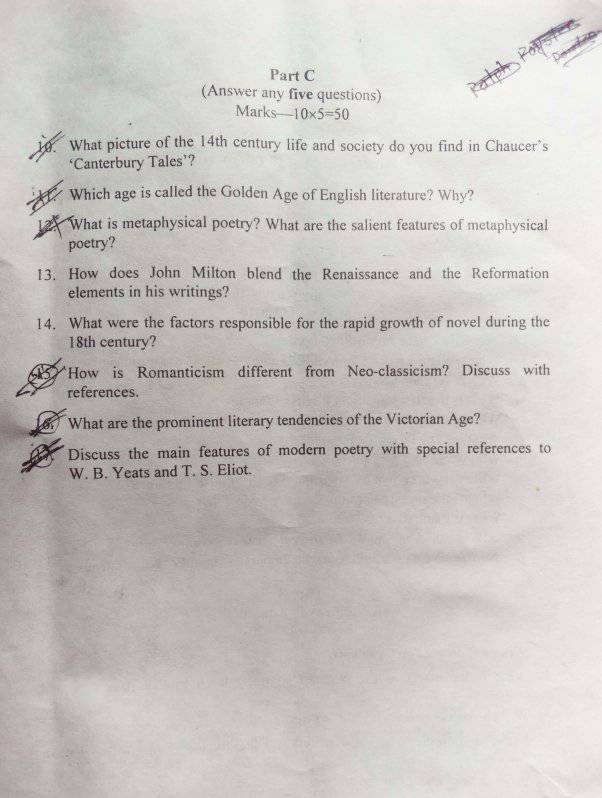
Question of 2020
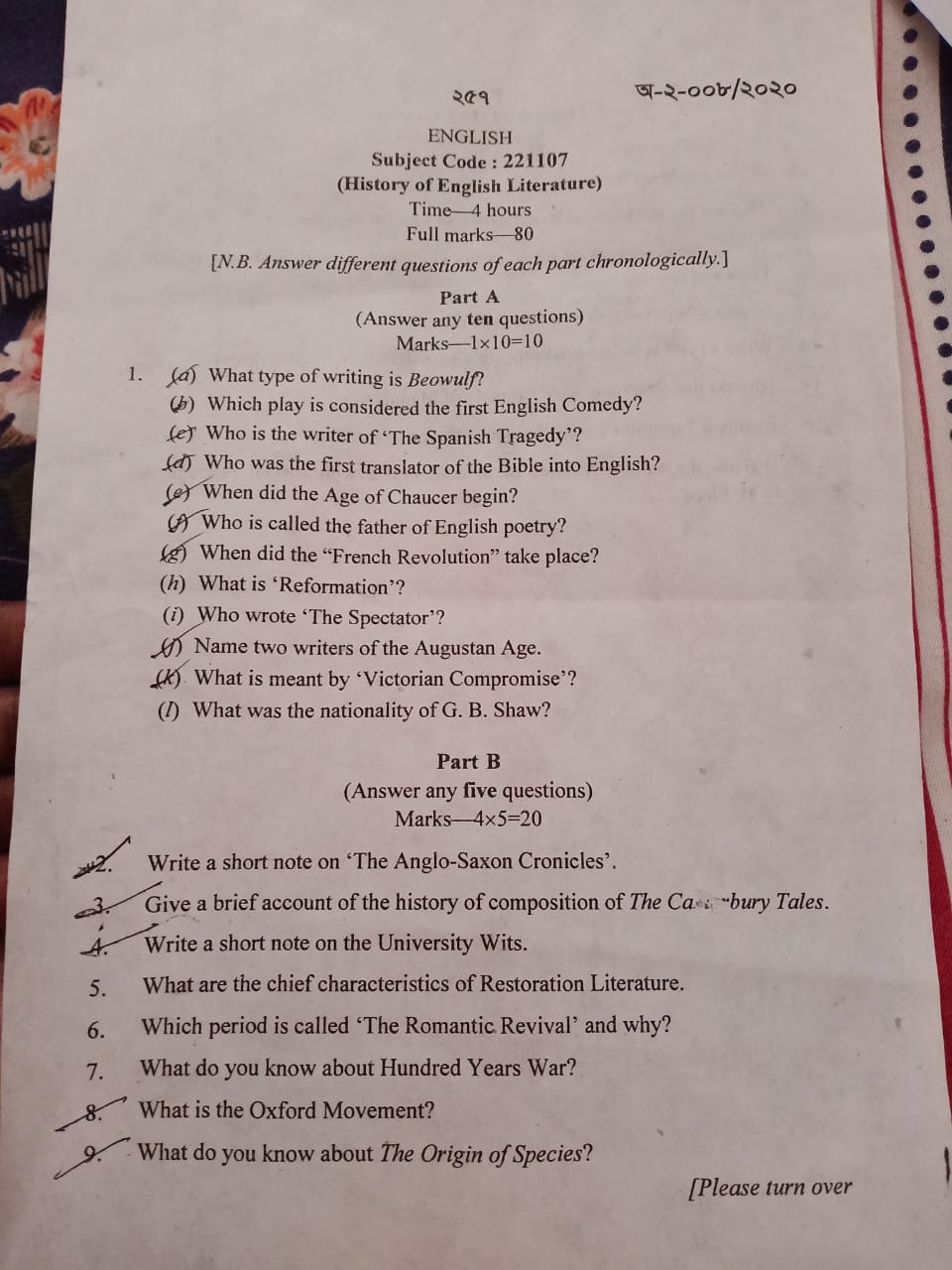
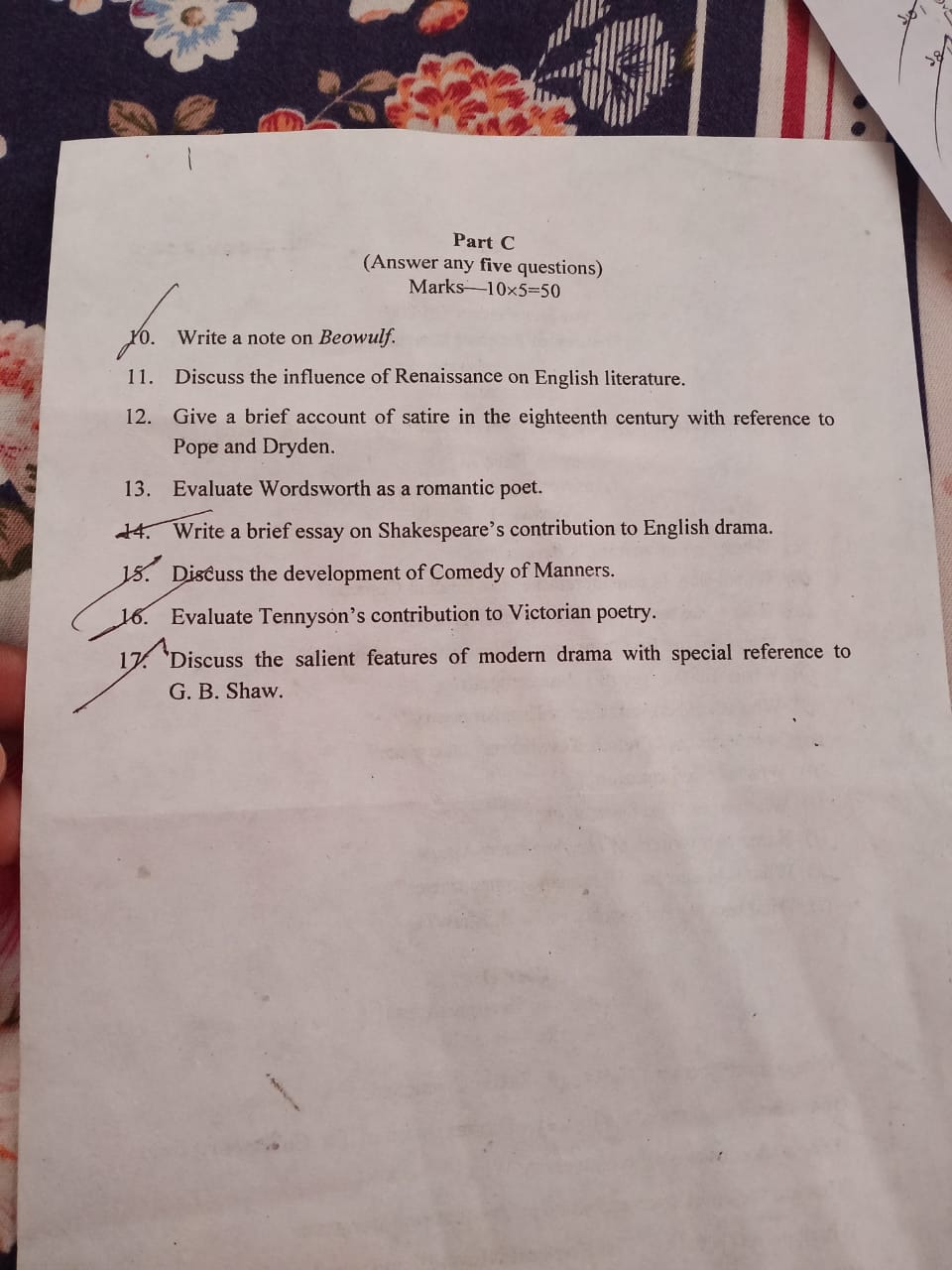
For 2nd Year Exam-2020
Part-C
- Describe the social picture of the Anglo-Saxon period.
- What are the salient features/social pictures of the Chaucerian Age?
- Describe the features of the Renaissance.
- Discuss Shakespeare’s contribution to English drama.
- Write an essay on the English Reformation movement.
- What are the salient characteristics of the Romantic Age?
- Who are the cavalier poets? Trace their contribution to English poetry.
- What are the salient traits of the Neo-classical Age?
- “Neo-classical Age is the age of prose and reason”- why?
- What are the salient trends of the Victorian Age?
- Discuss the 18th century as an age of satire.
- Describe the romantic poet’s contribution to the romantic age.
- Describe the features of the modern novel, drama/age
Part-B
- What is Anglicanism?
- What do you know about King Alfred?
- Why did the reformation happen in England?
- What is Renaissance?
- In what sense is John Milton the classiest?
- Who are University Wits?
- For what is Ben Jonson remarkable in the Jacobean Period?
- Who are Cavalier Poets?
- Write about the Globe Theatre.
- What is the Oxford Movement?
- Why is Bacon’s prose style significant??
- What is Romantic Movement?
- What Blake is called the precursor of Romanticism?
- Describe Coleridge’s ‘Willing Suspension of Disbelief’.
- Write a note on Keats’s Negative Capability.
- What is Pantheism?
- What are the features of Romantic Poetry?
- Write a note on “Stream of Consciousness”.
- What do you know by “Victorian Compromise”?
- What do you know about “The Origin of Species”?
- Write a short note on Pre-Raphaelitism.
- What is the Symbolist Movement?
- What is Absurd Drama?
Short Notes
- Anglo Saxon Chronicle,
- Hundred Years War,
- Black Death,
- Protestantism,
- Humanism,
- Blank-Verse,
- Tragedy,
- Heroic Couplet,
- Neo-Classicism,
- Victorianism.
History of English Literature
English literature has developed over many centuries. It has different periods, each with its own style, writers, and famous works.
Ages of English Literature and Their Features
Old English (Anglo-Saxon) Period (450–1066)
- War, religion, and heroic themes.
- Poetry was oral, later written in manuscripts.
- Strong influence of Norse and Latin.
- Famous Writers: Unknown poets.
- Famous Writings: Beowulf, The Wanderer, The Seafarer.
- Brief Description: Beowulf is an epic about a hero fighting monsters.
Middle English Period (1066–1500)
- Influence of French and Latin.
- Religious and chivalric themes.
- Growth of storytelling in poetry and prose.
- Famous Writers: Geoffrey Chaucer, William Langland, Sir Thomas Malory.
- Famous Writings: The Canterbury Tales, Piers Plowman, Le Morte d’Arthur.
- Brief Description: The Canterbury Tales is a collection of stories told by different characters on a journey.
Renaissance (1500–1660)
- Revival of classical ideas.
- Growth of drama, poetry, and prose.
- Exploration of humanism and individualism.
- Famous Writers: William Shakespeare, Christopher Marlowe, Edmund Spenser, John Milton.
- Famous Writings: Hamlet, Doctor Faustus, The Faerie Queene, Paradise Lost.
- Brief Description: Hamlet is a tragedy about a prince seeking revenge for his father’s murder.
Neoclassical Period (1660–1798)
- Logic, order, and reason were important.
- Satire and mock-epic style were common.
- Famous Writers: Alexander Pope, John Dryden, Jonathan Swift, Daniel Defoe.
- Famous Writings: The Rape of the Lock, Gulliver’s Travels, Robinson Crusoe.
- Brief Description: Gulliver’s Travels is a satire about human nature, told through a traveler’s adventures.
Romantic Period (1798–1837)
- Emotion, nature, and imagination were valued.
- Focus on individual freedom.
- Famous Writers: William Wordsworth, Samuel Taylor Coleridge, Lord Byron, Percy Shelley, John Keats.
- Famous Writings: Lyrical Ballads, Don Juan, Ode to a Nightingale.
- Brief Description: Lyrical Ballads is a collection of poems about nature and common life.
Victorian Period (1837–1901)
- Social issues, realism, and morality were key themes.
- Growth of the novel.
- Famous Writers: Charles Dickens, Charlotte Brontë, Emily Brontë, Thomas Hardy, Alfred Tennyson.
- Famous Writings: Great Expectations, Jane Eyre, Wuthering Heights, Tess of the d’Urbervilles.
- Brief Description: Great Expectations follows an orphan’s journey to adulthood and self-discovery.
Modern Period (1901–1945)
- Experimentation with form and style.
- Focus on psychology and social issues.
- Famous Writers: T.S. Eliot, James Joyce, Virginia Woolf, George Orwell.
- Famous Writings: The Waste Land, Ulysses, Mrs. Dalloway, 1984.
- Brief Description: 1984 is a novel about a totalitarian society and loss of freedom.
Postmodern Period (1945–Present)
- Questioning truth and reality.
- Use of multiple perspectives and fragmented storytelling.
- Famous Writers: Samuel Beckett, Salman Rushdie, Margaret Atwood, J.K. Rowling.
- Famous Writings: Waiting for Godot, Midnight’s Children, The Handmaid’s Tale, Harry Potter series.
- Brief Description: Waiting for Godot is an absurd play about two men waiting endlessly for someone who never comes.
 CSP
CSP